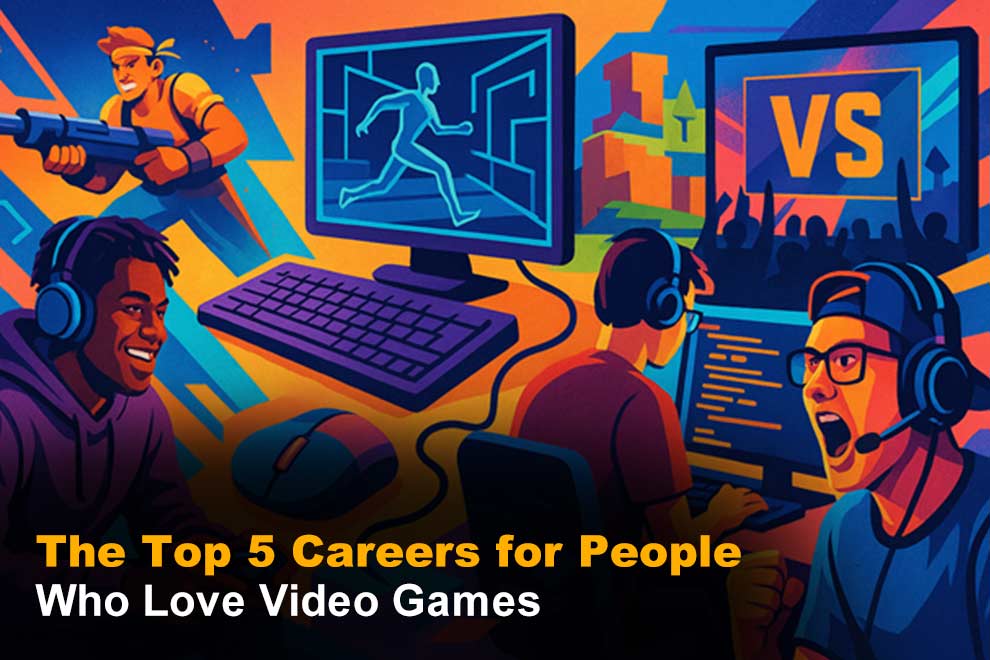Ever caught yourself thinking, “Man, I wish I could just make a living doing what I love—playing games?” Guess what: you can!
The gaming industry isn’t just booming: it’s exploding with opportunities for people who want to turn play into a profession. And the smartest way to get there? A Bachelor’s in Games Development. It’s like the ultimate starter kit: it equips you with coding skills, creative design chops, and the industry know-how to break into one of the coolest fields out there.
So, grab your headset, because we’re diving into the top 5 careers for gamers and how you can unlock them!
Why Choose a Career in Video Games?
Gaming isn’t just a pastime anymore: it’s a global industry worth more than film and music combined.
Millions of people log in daily to connect, compete, and explore virtual worlds. Behind every boss battle, cinematic cutscene, and esports tournament is a team of professionals who made it all happen.
If you’re creative, tech-savvy, or just obsessed with how games tick, this industry needs you. Working in games is about more than just creating “fun”—it’s about designing entire experiences, shaping pop culture, and driving one of the fastest-growing entertainment markets in the world.
Top 5 Careers for Gamers
1. Game Designer: Turning Ideas into Playable Worlds
Game designers are the masterminds of gameplay. They sketch out mechanics, storylines, and systems that keep players glued to the screen. Think about the adrenaline of a last-second win in Valorant or the emotional rollercoaster of The Last of Us. That’s design magic at work.
To nail this career, you need both creativity and structure. A Bachelor’s in Games Development arms you with the skills to design balanced systems, craft compelling narratives, and collaborate with artists and coders to bring your vision to life. You’re basically the architect of fun.
2. Game Programmer: Building the Core Mechanics
While designers dream, programmers build. These are the coders who make sure weapons fire, enemies react, and worlds run smoothly. If you’ve ever wondered how a perfectly timed double jump works, it’s the programmer’s logic behind it.
Mastering languages like C++, Python, or C# is key here. Programmers also need to be fluent in engines like Unity or Unreal. The perks? Solid salaries, career growth, and the chance to literally build the next groundbreaking game.
If you love solving puzzles and turning caffeine into clean code, this role is basically god-mode for you.
3. Level Designer: Crafting Immersive Environments
Ever felt your heart race while sneaking through the tight corridors of Resident Evil or marveled at the vast landscapes of Zelda: Breath of the Wild? That’s the power of level design.
Level designers map out the spaces where players explore, ensuring flow, pacing, and challenge all line up. It’s not just about placing walls and doors—it’s about storytelling through space.
You’ll need a sharp eye for visuals, an understanding of player psychology, and a love for experimenting with layouts. Your mission? To keep players immersed from start to finish.
4. QA Tester: Ensuring Games Run Smoothly
Here’s the cold, hard truth: no game ships flawless. Bugs happen. QA testers are the heroes who track them down before the public ever sees them. You’ll play unfinished builds, break systems on purpose, and log every weird glitch you can find.
It might not sound glamorous, but QA is the gateway into the industry. Tons of producers, designers, and programmers started here. Plus, who wouldn’t want to say, “Yeah, I played that game before anyone else?”
If you’re detail-oriented and have endless patience for testing, this is the entry point to your next career level.
5. Esports Manager or Content Creator: Expanding the Gaming Universe
Gaming careers don’t all sit behind code. Esports is now a billion-dollar industry with teams, tournaments, and sponsorships. As an esports manager, you’re the one coordinating the action—building teams, securing deals, and making sure events run like clockwork.
On the flip side, content creators are the faces of gaming culture. Streamers, YouTubers, TikTokers… They’re building communities, reviewing games, and sharing their skills with audiences of millions.
Both careers require hustle, consistency, and charisma. But if you’ve got the passion, you could be part of the culture driving gaming forward.
How to Prepare for a Career in Gaming (Degrees, Skills, and Experience)
So, how do you go from gamer to game pro? Here’s the breakdown:
1. Education Foundations
A Bachelor’s in Games Development is your perfect training ground. You’ll learn coding, design, 3D modeling, and project management, all directly linked to real-world game production.
2. Build a Portfolio
Don’t just talk about what you can do, show it! Create mods, build indie projects, or join online game jams. A strong portfolio is your ultimate weapon when applying for jobs.
3. Gain Practical Experience
Internships and collaborations are critical. Major studios and indie companies alike are looking for passionate newcomers who’ve already tested their skills in real-world scenarios.
4. Master Soft Skills
Communication, teamwork, and adaptability matter as much as your technical ability. Studios are team environments—you’ll be bouncing ideas, solving conflicts, and meeting deadlines daily.
5. Stay Ahead of Trends
From VR and AR to AI-powered NPCs, the industry moves fast. The more you experiment and keep learning, the more competitive you’ll be when it’s time to respawn into the job market.
Final Thoughts: Turning Passion for Games into a Career
Video games aren’t just something you do after school—they’re an entire industry where passion meets profession.
Whether you’re scripting epic stories, coding flawless mechanics, designing unforgettable levels, testing for perfection, or managing esports legends, there’s a career path out there waiting for you.
And the best part? You don’t have to grind alone. A Bachelor’s in Games Development equips you with the skills, experience, and connections to transform your love of gaming into a future-proof career.
Ready to stop just playing the game and start making it? This is your next level!
Also Read: Everything You Need to Know About Video Poker in Online Casinos










